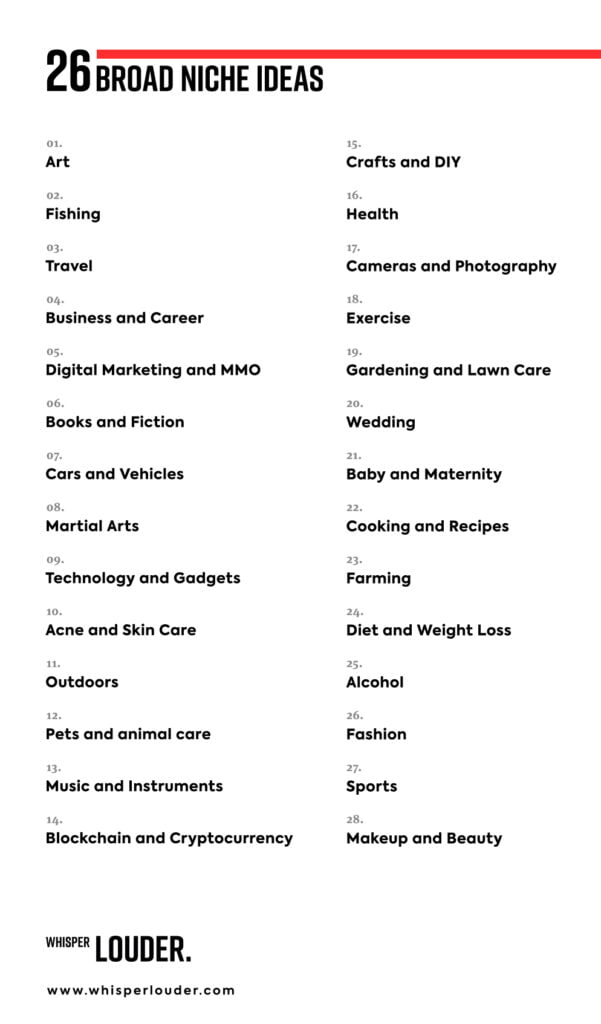5 Tips to Find SEO Rich Blog Topics Easier
Are you struggling to find some inspiration for your new blog post? Heres five ways to generate SEO rich blog topics
Search engine optimised blogging is all about volume, the volume of keywords, the volume of any given article, and most importantly, the volume of blog posts in general. So the most challenging aspect here is where to start? How do I come up with SEO-rich blog topics, and regularly enough to keep a blog alive and thriving?
So, if you find yourself wanting to start the next big blog but don’t know where to start, or even if you’re a veteran found in a creative slump, it might be helpful to take a little time and brush up on topic creation.
After all, you can’t gain any followers without articles, and you can’t have any articles without killer topics to start with.
1. Finding Your Niche

When thinking about what topics to write about, there are a couple of items you need to find out first. The most important one is what niche you want to corner with your blog. There are a whole lot of blogs out there, and you’re going to need to narrow your focus into a niche if you want to stand out.
Pick Something You’re Passionate About
Maybe you have a hobby or a passion project that you’ve been working on. You might also find yourself as an expert in a given field. Take these things that you’re already interested in and build upon them.
Not only will niching yourself into something that strongly interests you keep you invested, but it will keep your readers invested as well. This is because readers can tell when the author of what they are reading is enjoying the topic as well.
What Are Others Passionate About?
When looking into topics for blogs and blog posts in general, you want to think about what your audience even wants to read. Getting people interested enough in your blog can be tricky. Getting them to come back can be even trickier.
Picking a hobby as your niche is one of the most popular and successful methods of ensuring an engaged audience. When people are passionate about something, they are more likely to search for content about it and come back to the content they like.
Remember, an enthusiastic audience is what’s going to result in clicks and eventually ad revenue.
2. See What’s In Demand
There are a couple of different routes to take when looking into what your potential readers are interested in. An excellent place to start is looking into what questions your audience is asking themselves.
Questions are some of the most searched terms on the internet. Answering the most asked questions in the best ways is an excellent way to climb the SEO ranks. “How do you find these answers?” you might be asking.
Google Trends is a great place to start to find in-demand topics. Keyword tools are also another alternative. First, look up a popular keyword and see what words are being searched along with it. This can give you a good idea of what questions are most commonly being asked.
Optimising your content around what readers are searching will enable you to reach a larger organic audience. This can also help you make your topics much more unique and more likely to grab a new viewer’s eye.
3. Steal
There is a saying, “Good artists borrow, great artists steal.” Obviously, there is an amount of tact involved here, but there is no shame in taking inspiration from those around you.
Taking a successful idea you like and choosing to emulate it is a great way to tag along any waves of success that already exist. After all, nothing is truly original; it’s more how you write it and less what you’re writing here.
A good way to go even further here is to take these already successful ideas and take them to the next level. “5 Recipes to Take Your Cookout Up a Notch” might sound a whole lot better if it were “10 Recipes to Make Your Summer Cookout Into the Event of the Summer.”
Play around here and have fun with it. Building upon what already exists is a great way to get started.
Bonus: Learn how to repurpose old blog content for social media
4. Stockpile Ideas
This may seem like a no-brainer, but it is a great habit to get into when you find yourself in a slump or are just starting out. Creating a database for topic ideas can go a long way in content creation.
Creating a Database
Creating a database can be done with an Excel spreadsheet and can be designed in whatever way that makes sense to you. Attach keywords and sub-keywords to your topics, and you will get quite a helpful tool in coming up with SEO rich blog topics in no time.
Brainstorm
Another good habit to get into is taking the time to brainstorm topics. This process can be slow at first, but once you find yourself regularly updating your spreadsheets, you’ll be surprised by just how many topics you have accrued.
5. Crowdsource Your Audience
Sometimes the group that knows the most about what your audience wants to read about is your audience themselves. A passionate audience will be more than willing to let you know topics and subjects they are interested in.
At the end of your articles, you can prompt a call to action and a way to contact you. The prompt can be something along the lines of, “I would love to hear your feedback! Is there anything that you want to see more of or other topics entirely?”
If they tell you they want to see something specific, then you might want to believe them. Whatever it is, just remember to remain in your voice and have fun with it.
Who knew just how much could go into coming up with a blog topic? From shopping around competitive blogs to optimising your content for search engines, there are endless resources for an aspiring blogger to utilise.
Once many of these steps are taken a couple of times over, it will be like second nature, and you’ll be putting down blog topics like it’s nothing. Turn it into a routine, and nothing can stop you from becoming a blog topic machine.
